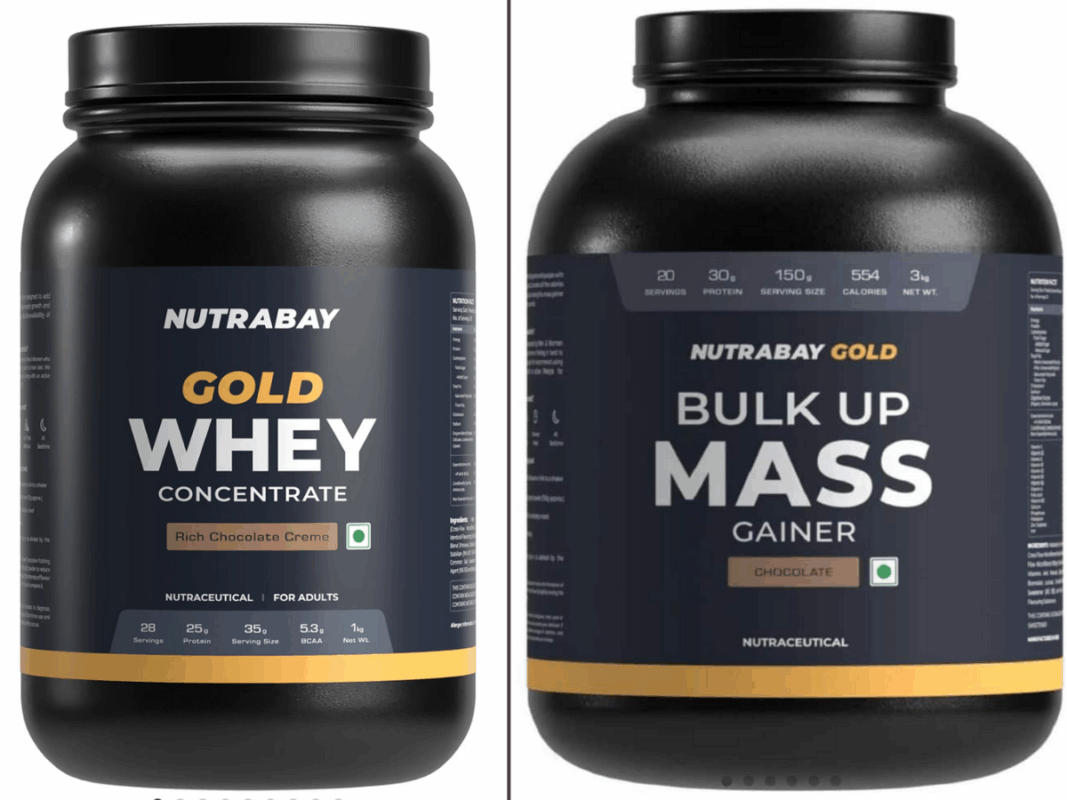Table of Contents
For most people, the word “weight gain” brings to mind images of fast food, fried snacks, or sugary treats. But ask anyone who struggles with being underweight, and you’ll hear a very different story. Gaining weight, especially in the form of lean muscle, can be just as tough as losing it. Many people eat more, although the scale scarcely shifts. Others manage to put on weight but realise it’s mostly fat around the belly instead of muscle.
This is where protein powder for weight gain comes in. Protein isn’t just for bodybuilders, it’s the foundation of muscle tissue, recovery, and strength. When coupled with a calorie-rich diet and physical exercise, the appropriate protein powder can help you gain weight in a healthy, sustainable way.
But with so many alternatives, whey, muscle gainers, plant-based blends, casein, how do you know what’s ideal for your body and goals? Let’s break it down.
Understanding Weight Gain
To gain weight, you need to be in a calorie surplus, meaning you consume more calories than your body burns. But here’s the catch: If your surplus comes mostly from junk food, you’ll gain fat.
If it comes from protein-rich, nutrient-dense sources paired with resistance training, you’ll gain muscle.
A healthy weight gain diet usually includes:
- Complex carbohydrates (rice, oats, quinoa, sweet potatoes)
- Healthy fats (nuts, seeds, olive oil, nut butters)
- High-quality proteins (chicken, fish, eggs, lentils, dairy, protein powder)
Protein is particularly the most important because it supports muscle repair and growth. Without enough protein, those extra calories might just turn into fat storage instead of lean muscle mass.
What is Protein Powder?

Protein powder is a concentrated source of protein derived from milk, plants, or other sources. It’s processed into a fine powder that can be mixed with water, milk, or smoothies.
The most common types include:
- Whey Protein Powder: This is derived from milk, is fast-digesting & rich in amino acids.
- Casein Protein: It is a slow-digesting protein, ideal before bedtime.
- Plant Protein Powder: This is made from peas, brown rice, or a blend of two plant proteins, making it suitable for vegans.
- Protein Blends: Mix of different whey protein sources for balanced digestion and nutrition.
Protein powder isn’t a magic solution. It simply makes it easier to meet your daily protein target, which can be challenging if you’re trying to gain weight and need more than 1.2–1.6 grams of protein per kilogram of body weight daily.
Protein Powder vs. Mass Gainer – What’s the Difference?

When people search for weight gain powder, they often get confused between protein powders and mass gainers. Here’s the difference for better understanding:
- Protein Powder: It is high in protein, moderate in carbs and fat. It also helps build lean muscle without unnecessary fat gain.
- Mass Gainer: These are mostly high in calories, loaded with carbs, protein, and sometimes added fats. It is designed for people with very high calorie needs or “hard gainers” who struggle to gain weight.
Which one should you use?
- If you already eat a calorie-rich diet but lack protein intake then choose whey or plant protein powder.
- If you can’t meet your calorie needs through food alone, a mass gainer can be useful.
Best Types of Protein Powder for Weight Gain
Not all protein powders are created equal. Depending on your body type, dietary preference, and digestion, you may find one type more effective than the other.
1. Whey Protein Powder
- This is rapidly digested, making it ideal for a post-workout meal.
- Contains all essential amino acids, especially leucine, which stimulates muscle growth.
- Examples: Nutrabay Whey Protein Concentrate, Optimum Nutrition Gold Standard Whey.
2. Casein Protein
- This one is a slow-digesting protein source that releases amino acids gradually.
- It works well as a bedtime shake to prevent overnight muscle breakdown.
- Example: Nutrabay Casein Protein.
3. Plant Protein Powder
- It is perfect for vegans and those with lactose intolerance.
- Pea protein and rice protein are popular choices, often blended to balance the amino acid profiles.
- Examples: Nutrabay All Natural Plant Protein.
4. Protein Blends
- This one is a mix of whey protein like isolate, concentrate and hydrolysate.
- It provides both fast and slow digestion for sustained amino acid release.
- Examples: Nutrabay Tri-Blend Whey Protein.
5. Lean Muscle Gainers
- This comes in a middle ground between whey protein and mass gainers.
- Provide moderate carbs along with protein, useful for people who want to add size without excess fat.
- Example: Nutrabay Mega Mass Gainer.
How to Use Protein Powder for Weight Gain

Protein powder only works when paired with a healthy balanced diet and muscle training. Here’s how to use it correctly:
- Timing:
- Post-workout for quick muscle recovery.
- As a mid-morning or evening snack to boost protein intake.
- Before bed (casein protein) for overnight muscle repair.
- Dosage:
- Usually 1–2 scoops (20–40 grams of protein) per serving.
- Adjust based on your total daily protein requirement.
- Mixing:
- Blend with milk instead of water for extra calories.
- Add calorie-dense foods like oats, peanut butter, bananas, or nuts to it.
- Example Weight Gain Shake:
- 1 scoop whey protein
- 1 glass full-fat milk
- 1 banana
- 2 tablespoons peanut butter
- Handful of oats
This drink provides approx. 500+ calories in one go.
Weight Gain Diet
Even the best protein powder for weight gain won’t help if your diet isn’t aligned as per your health goals. Some tips include:
- Prioritize whole foods first, eggs, chicken, fish, paneer, legumes.
- Use protein powder to fill gaps.
- Combine with calorie-dense snacks like trail mix, smoothies, nut butters.
- Spread protein intake across meals and not in just one heavy shake.
A sample weight gain diet day could look like this:
- Breakfast: High Protein Oats with milk, nuts, and whey protein.
- Mid-morning: Banana and peanut butter smoothie.
- Lunch: Rice, dal, chicken curry/tofu curry, vegetables.
- Pre-workout: Fruit with whey protein shake.
- Post-workout: Whey protein with oats & dates.
- Dinner: Quinoa/ chapati, paneer, stir-fry veggies.
- Before bed: Casein shake or warm milk.
Weight Gain Tips Beyond Supplements
While protein powder for weight gain can accelerate progress, don’t ignore the bigger picture:
- Strength Training: Focus on exercises like progressive overload, squats, deadlifts, bench press.
- Sleep: Try to complete at least 7–8 hours for recovery and growth.
- Hydration: Protein metabolism requires adequate water, so try to increase your water intake.
- Consistency: Weight gain is a gradual process; track your calories and progress, and do not expect results in a short time span.
Conclusion
Weight gain is frequently misinterpreted, as eating correctly is more important than simply eating more. You can develop lean muscle and a healthy physique by combining a well-balanced weight gain diet, organised strength training, and the appropriate protein powder.
Your results will depend on consistency and general nutrition, regardless of whether you use whey protein powder, a plant-based blend, or a bulk gainer. Consider protein powder an aid rather than a substitute for actual food.
Therefore, if you’ve been having trouble “gaining weight,” start by figuring out how many calories you need, making dietary changes, and including the appropriate protein powder in your diet. With time, you’ll see noticeable gains in strength, vitality, and self-assurance in addition to the numbers on the scale.
Frequently Asked Questions (FAQs)
Is protein powder for weight gain good?
Yes, when combined with a calorie-rich diet and strength training, protein powder supports muscle growth and prevents fat-dominant weight gain.
Which is better: whey protein or mass gainer?
If you eat enough food but lack protein in your diet, go for whey protein. If you struggle to meet overall calorie needs, use a mass gainer.
Can women use protein powder for weight gain?
Yes, protein is essential for everyone and women can also benefit from protein supplements when aiming to gain healthy weight.
How long does it take to see results?
With consistent training, balanced diet, and proper supplementation, noticeable weight gain might usually happen in about 6–12 weeks.
Can I use protein powder for weight loss and muscle gain?
Yes, if taken in moderation with a calorie deficit diet, protein can help preserve lean muscle mass while losing fat.
Can I take plant-based protein powder for weight gain?
Yes, you can. Plant proteins are often mixed (like pea and rice protein) to form a “complete protein” with all essential amino acids. Research shows that when total protein intake is adequate, they are highly effective for building muscle mass.
What ingredients should I look for in a good protein powder for weight gain?
Look for powders with a good source of carbohydrates and sometimes healthy fats (like MCT oil or flaxseed). Ingredients like Creatine Monohydrate are also often added to boost muscle gain and performance.

